Here’s a look back at past winners and the books that made that year’s shortlist. You’ll also find our Jury from each award season
Winner
Who Owns Outer Space? International Law, Astrophysics, and the Sustainable Development of Space (Cambridge University Press)
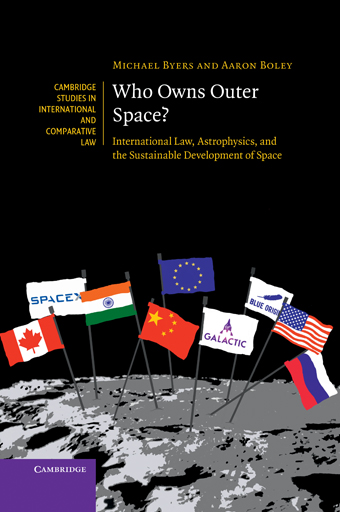
Space exploration, and exploitation, is evolving at a rapid pace. Who Owns Outer Space? draws attention to the many risks that are linked to the deployment of very large numbers of new satellites, and the growing rivalries among leading spacefaring nations and corporations. The book includes an examination of existing international treaties and state practices that show both the effectiveness of the rules and practices already in place and, importantly, their limitations, as well as suggesting how international law and other cooperative arrangements could be strengthened to avoid catastrophic incidents. The authors provide a roadmap into uncertain territory for Canadian policymakers.
Michael Byers holds the Canada Research Chair in Global Politics and International Law at the University of British Columbia and co-directs the Outer Space Institute. His previous book, International Law and the Arctic (Cambridge University Press) won the 2013 Donner Prize.
Aaron Boley holds the Canada Research Chair in Planetary Astronomy at the University of British Columbia. He co-directs the Outer Space Institute, a transdisciplinary organization that addresses challenges associated with NewSpace, conducting research into planetary dynamics, and space sustainability.
Runners Up
The Legal Singularity: How Artificial Intelligence Can Make Law Radically Better (University of Toronto Press)
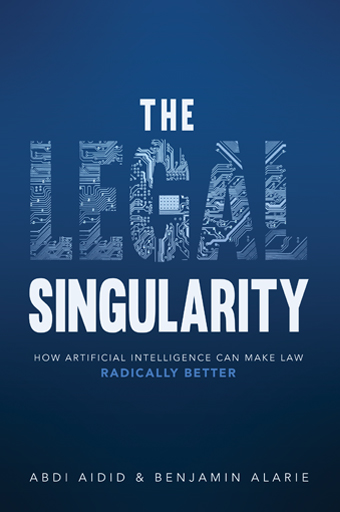
The Legal Singularity addresses the transformative potential of artificial intelligence in the legal sector. It considers the evolving role of technology in governance and the administration of justice, offering insights into how AI can enhance efficiency, fairness, and accessibility in legal processes. It also explores how the integration of AI in law could revolutionize policy development, regulatory compliance, and public service delivery. An important and timely book that will generate a meaningful conversation about AI and its role in the pursuit of justice.
Abdi Aidid researches and teaches in the areas of civil procedure, torts, and law and technology. He received his B.A. from the University of Toronto, his J.D. from Yale Law School, and his LL.M from the University of Toronto Faculty of Law, where he is currently assistant professor and a member of the Ethics of AI Lab there.
Benjamin Alarie, is a graduate of the University of Toronto and Yale Law School, and began his career as a law clerk for Madame Justice Louise Arbour. He now holds the Osler Chair in Business Law at the University of Toronto Faculty of Law and is an affiliated faculty member at the Vector Institute for Artificial Intelligence.
Pandemic Panic: How Canadian Government Responses to COVID-19 Changed Civil Liberties Forever (Optimum Publishing International)
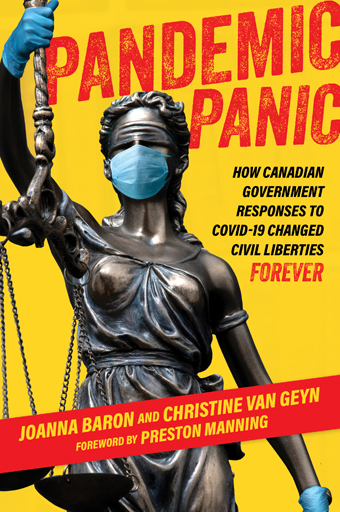
This book dives into the significant and contentious issue of how government policies during the COVID19 pandemic impacted civil liberties. It will be very relevant to policymakers in that it provides a critical analysis of past actions and their implications, offering lessons that can inform future crisis response and policy development. The authors have tackled a difficult and potentially controversial subject with serious analysis and recommendations, challenging readers to consider the delicate balance between public health and individual freedoms—a dilemma that is timeless and universal.
Joanna Baron is a graduate of McGill University Faculty of Law, and is currently Executive Director of The Canadian Constitution Foundation. She was a founding director of the Runnymede Society, a non-partisan national association of law students. She clerked at the Ontario Court of Appeal, and practiced criminal law with Edward Greenspan.
Christine Van Geyn is Chief Litigation Director at The Canadian Constitution Foundation. A graduate of University of Toronto, she earned her law degree at Osgoode Hall, and also studied at New York University School of Law. She is a noted journalist and broadcaster.
The Privacy Fallacy: Harm and Power in the Information Economy (Cambridge University Press)
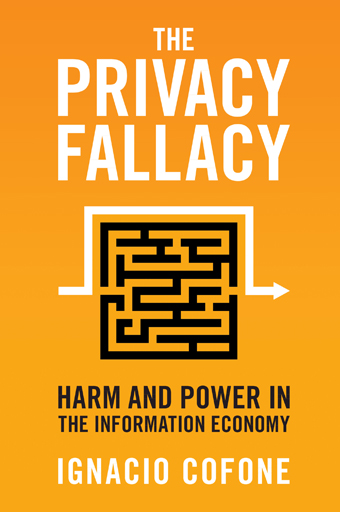
Who can access our information and what they are doing with it has become an issue of increasing concern to individuals, corporations and governments worldwide. In The Privacy Fallacy, Cofone describes why our current laws fail to protect us against corporate digital harm. His proposed reforms put the onus on corporations to use data responsibly and be held accountable for any violations that result in loss of privacy and attendant harms. Through well-defined issues, sound analysis and evidence-based arguments, Cofone navigates the complexities of privacy, harm, and power dynamics in the information economy.
Ignacio Cofone is an Associate Professor and Canada Research Chair in Artificial Intelligence Law & Data Governance at McGill University Faculty of Law, where he teaches Privacy Law, Artificial Intelligence Regulation and Advanced Obligations. He is currently researching liability for privacy harm and A.I. discrimination.
Wrongfully Convicted: Guilty Pleas, Imagined Crimes, and What Canada Must Do to Safeguard Justice (Simon & Schuster Canada)
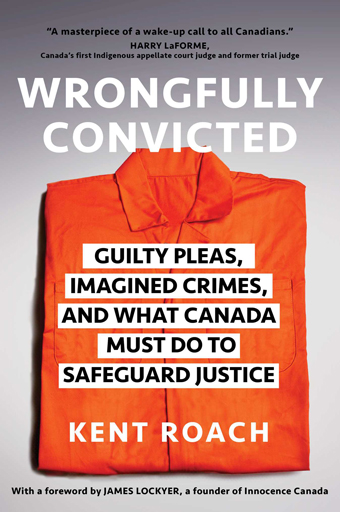
In this deft presentation of the deficiencies in the Canadian justice system, Roach chronicles numerous instances of wrongful conviction, as well as outlining remedies which, if implemented, could prevent, detect and remedy such cases. This is a systemic problem. Roach notes that between 1989 and 2008 Canada conducted no less than seven multi-year and multi-million-dollar inquiries into specific wrongful convictions. He reminds us that the burden of wrongful conviction falls disproportionally on the disadvantaged. Clear, thorough, compelling, evocative, and jargon-free, Wrongfully Convicted stands out as a valuable resource for policymakers, lawyers, and advocates for justice.
Kent Roach is Professor at University of Toronto Faculty of Law. A prolific scholar, his books include Canadian Justice, Indigenous Injustice which was shortlisted for the 2019 Shaughnessy Cohen Prize; and Canadian Policing: Why and How it Must Change, which was shortlisted for the 2022 Donner Prize.
Louise Frechette
CHAIR
Louise Fréchette was the Deputy Secretary-General of the United Nations from 1998 to 2006, following a career in the Public Service of Canada, serving notably as Ambassador to Argentina and Uruguay (1985-1988), Ambassador to the United Nations (1992-1994), Associate Deputy Minister of Finance (1995) and Deputy Minister of National Defence (1995-1998).
Since leaving the UN in 2006, Fréchette has been associated with a number of academic and research institutions in Canada and abroad. In June 2019, Fréchette completed a 3-year mandate as Chair of the Supervisory Board and of the Council of CARE International after serving as chair of CARE Canada from 2011 to 2015. She is currently a Board member of the Global Leadership Foundation.
Louise Fréchette has a degree in History from the University of Montreal and a Certificate in Economy from the College of Europe in Bruges, Belgium. She is an Officer of the Order of Canada.
Neil Desai
Neil Desai is executive vice-president with Viral Nation where he focuses on the company’s technology solutions with enterprise and government clients.
Neil is a senior fellow with the Centre for International Governance Innovation and entrepreneur-in-residence with the Rogers Cyber Catalyst. He is a regular contributor to the Globe and Mail and Canadian Broadcasting Corporation (CBC) News Network. Neil also serves on the Board of Directors of the Public Policy Forum, Alcohol and Gaming Commission of Ontario, Innovation Asset Collective, ClearRisk Inc. and is a past director of YMCA Canada. He previously served in the Government of Canada in senior roles at Global Affairs Canada and the Prime Minister’s Office.
Prior to joining Viral Nation, he served on the leadership team of Magnet Forensics, a technology company that develops digital investigation solutions used by more than 4,000 police, national security and other public and private organizations in over 100 countries to investigate crimes such as human trafficking, child exploitation, terrorism and ransomware.
Jack M. Mintz
Jack M. Mintz is the President’s Fellow of the School of Public Policy at the University of Calgary after serving as the Palmer Chair and founding Director from January 1, 2008 to June 30, 2015. He serves on the boards of Mackenzie Health and the Aristotle Foundation for Public Policy. He is also a senior fellow to numerous think-tanks including the C. D. Howe Institute, MacDonald-Laurier Institute, CESIfo Germany and International Tax and Investment Centre, Washington D.C.
Jack Mintz also served on numerous panels and boards at the federal and provincial levels including Vice-President and chair of the Social Sciences and Humanities Research Council 2012-2018. He has consulted widely with the World Bank, the International Monetary Fund, the Organization for Economic Co-operation and Development, federal and provincial governments in Canada, and various businesses and non-profit organizations in Canada and abroad.
Jack Mintz became a member of the Order of Canada in 2015 as well as receiving the Queen Elizabeth Diamond Jubilee Medal in 2012 for service to the Canadian tax policy community. Jack Mintz’s 2001 book Most Favoured Nation was shortlisted for the Donner Prize
Maureen O’Neil
Maureen O’Neil chairs the board of WaterAid International and is a member of the boards of the Centre for International Governance Innovation and the Centre for the Study of Living Standards.
She is the former senior executive officer of EHealth Ontario and the Canadian Foundation for Healthcare Improvement (CFHI).
Maureen O’Neil is former chair of the board of the United Nations Research Institute for Social Development (UNRISD), the Board of Trustees of the International Institute for Environment and Development, Chair of the Board of Carleton University, former President of the International Development Research Centre, IDRC’s Think Tank Initiative and earlier in her career Deputy Minister of Citizenship in Ontario.
She has also represented Canada on the UN Commission on the Status of Women and on committees of the Organisation for Economic Co-operation and Development and has been a member of the UN Committee for Development Planning and the Board of the UNRISD.
She has received honorary doctorates from Laurier University, Carleton University, and the University of Ottawa. In June 2011, Maureen was named an officer of the Order of Canada for public service, recognizing her contributions to international development, gender equality and human rights.
Karen Restoule
Karen Restoule is a Vice President at Crestview Strategy based in Toronto. An expert at fostering collaboration among parties by identifying common goals and objectives, she offers clients expertise in community, stakeholder, and Indigenous engagement, transformative leadership, change management, and policy development.
Prior to joining Crestview Strategy, Karen led an environmental consulting firm working with Indigenous communities, building on a prior role supporting First Nations leaders as Director of Justice at Chiefs of Ontario where she advanced innovative policy solutions to legacy challenges. She also co-founded BOLD Realities, to advance the industry-Indigenous relationship. Previously, Karen led the modernization of Ontario’s administrative justice system at Tribunals Ontario.
Karen is a graduate of the University of Toronto and of the University of Ottawa’s French Common Law Program. She serves on a number of boards, has received awards for her contribution to society, and is a contributor to thehub.ca. Karen is Ojibwe from Dokis First Nation.
Frederick Wien
Fred Wien served as Director of the Maritime School of Social Work at Dalhousie University from 1981-86 and then as Deputy Director of Research at the Royal Commission on Aboriginal Peoples heading the research program on employment and economic development.
At the national level, he has served as a member and chair of the Advisory Board for the Institute of Aboriginal Peoples Health (IAPH/CIHR). He is the Nominated Principal Investigator for a major research grant from CIHR for the project: “A Poverty Reduction Approach to Improving the Health and Well-being of First Nation Communities in Canada” as well as for a CIHR-funded project on “Building a Social Policy Framework for the Health and Well-being of Mi’kmaq Communities in Nova Scotia”.
A graduate of Queen’s University, with M.A. and PhD from Cornell University, Wien was made a Member of the Order of Canada in 2015
